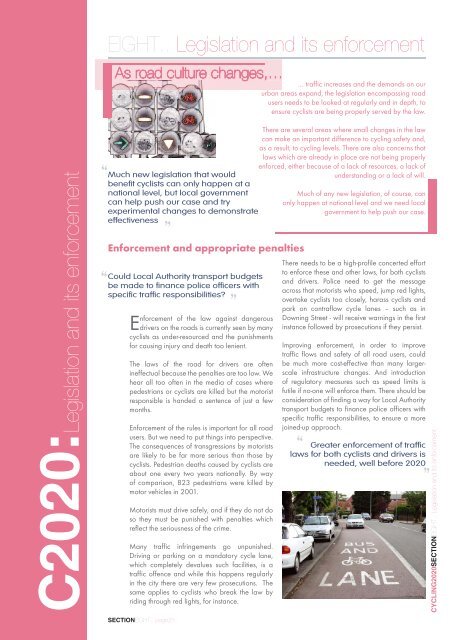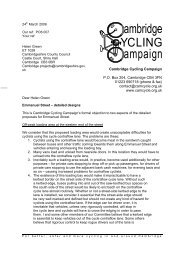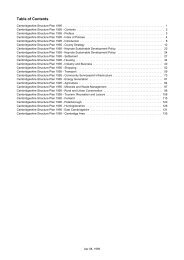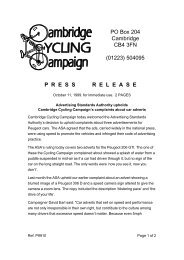Printable PDF version - Cambridge Cycling Campaign
Printable PDF version - Cambridge Cycling Campaign
Printable PDF version - Cambridge Cycling Campaign
- No tags were found...
You also want an ePaper? Increase the reach of your titles
YUMPU automatically turns print PDFs into web optimized ePapers that Google loves.
EIGHT.. Legislation and its enforcementAs road culture changes,…… traffic increases and the demands on oururban areas expand, the legislation encompassing roadusers needs to be looked at regularly and in depth, toensure cyclists are being properly served by the law.C2020:Legislation and its enforcement““Much new legislation that wouldbenefit cyclists can only happen at anational level, but local governmentcan help push our case and tryexperimental changes to demonstrateeffectiveness“Enforcement and appropriate penaltiesCould Local Authority transport budgetsbe made to finance police officers withspecific traffic responsibilities?Enforcement of the law against dangerousdrivers on the roads is currently seen by manycyclists as under-resourced and the punishmentsfor causing injury and death too lenient.The laws of the road for drivers are oftenineffectual because the penalties are too low. Wehear all too often in the media of cases wherepedestrians or cyclists are killed but the motoristresponsible is handed a sentence of just a fewmonths.Enforcement of the rules is important for all roadusers. But we need to put things into perspective.The consequences of transgressions by motoristsare likely to be far more serious than those bycyclists. Pedestrian deaths caused by cyclists areabout one every two years nationally. By wayof comparison, 823 pedestrians were killed bymotor vehicles in 2001.Motorists must drive safely, and if they do not doso they must be punished with penalties whichreflect the seriousness of the crime.Many traffic infringements go unpunished.Driving or parking on a mandatory cycle lane,which completely devalues such facilities, is atraffic offence and while this happens regularlyin the city there are very few prosecutions. Thesame applies to cyclists who break the law byriding through red lights, for instance.“There are several areas where small changes in the lawcan make an important difference to cycling safety and,as a result, to cycling levels. There are also concerns thatlaws which are already in place are not being properlyenforced, either because of a lack of resources, a lack ofunderstanding or a lack of will.Much of any new legislation, of course, canonly happen at national level and we need localgovernment to help push our case.There needs to be a high-profile concerted effortto enforce these and other laws, for both cyclistsand drivers. Police need to get the messageacross that motorists who speed, jump red lights,overtake cyclists too closely, harass cyclists andpark on contraflow cycle lanes – such as inDowning Street - will receive warnings in the firstinstance followed by prosecutions if they persist.Improving enforcement, in order to improvetraffic flows and safety of all road users, couldbe much more cost-effective than many largerscaleinfrastructure changes. And introductionof regulatory measures such as speed limits isfutile if no-one will enforce them. There should beconsideration of finding a way for Local Authoritytransport budgets to finance police officers withspecific traffic responsibilities, to ensure a morejoined-up approach.“Greater enforcement of trafficlaws for both cyclists and drivers isneeded, well before 2020“CYCLING2020SECTIONEIGHT.. Legislation and its enforcementSECTIONEIGHT.. page23







